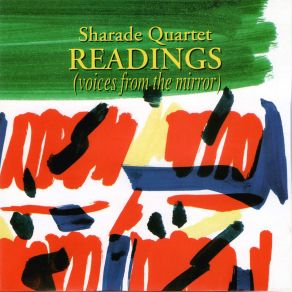Readings (Voices from the Mirror)
Download links and information about Readings (Voices from the Mirror) by Sharade Quartet. This album was released in 1995 and it belongs to Jazz, Contemporary Jazz genres. It contains 8 tracks with total duration of 45:47 minutes.

|
|
|---|---|
| Artist: | Sharade Quartet |
| Release date: | 1995 |
| Genre: | Jazz, Contemporary Jazz |
| Tracks: | 8 |
| Duration: | 45:47 |
| Buy it NOW at: | |
| Buy on iTunes $7.92 | |
Tracks
[Edit]| No. | Title | Length |
|---|---|---|
| 1. | The Notes Are Yellow | 4:55 |
| 2. | Angeli | 6:41 |
| 3. | Pat | 5:45 |
| 4. | Time in My Mind | 5:39 |
| 5. | Il volo di Florindo | 7:20 |
| 6. | My Favorite Kings | 8:16 |
| 7. | One for Oatts | 2:35 |
| 8. | Elegy for Max | 4:36 |
Details
[Edit]Pianist Nuccio Intrieri is a tireless crusader for the angular in jazz. In their compositions and improvisations, his quartets and trios always have quirky elements meant to draw the listener in by a seductive unfamiliarity with the material. He accomplishes this with small compositional figures designed to bend your ear just enough to draw you closer and then wrap you up so tightly in the continued gradual unfolding of the work that, by the time it's over, you feel like you're just getting started. Intrieri will employ any means to get this across, and this quartet date is no exception. Utilizing the stellar guitar-slinging talents of Pietro Condorelli, Lello Pareti on contrabass, and the shimmering, dancing stick work of Giampaolo Ascolese, Intrieri once again drafts a blueprint for a hyper-modern jazz that may be distant in its instrumentation and phrasing, but is no further from the immediately traceable tradition of jazz and blues given its melodic ideas and how group dynamics make those ideas bigger. Perhaps no place better illustrates this than the album's centerpieces: Intrieri's "Time in My Mind" and Condorelli's "My Favorite Kings" (for John Scofield and B.B. King). On the former, Intrieri doubles on synthesizer to play alongside Condorelli's guitars. The rhythm is straight out of the Caribbean and lines bump off each other in celebratory intervallic fury. When Condorelli takes his solo, the new rhythm scheme is in place and he has to fight to bring it back. Meanwhile, everybody else is falling inside the groove, the new one, created by the poignant sticking of Ascolese. On the latter, a blues line courses through Intrieri's melody and into his own solo that drives home the Ellingtonian swing inherent in the modern blues, before Condorelli tries to deconstruct it with arpeggios and gives up — he is eventually taken in and comes up with huge, airy, sweeping chords to push Intrieri to new heights in blues vamping. In sum, there is a freshness in this date that takes the "modern creative" tag and throws it into the whirlwind as too old-fashioned and too serious. This is hot music played with big smiles and killer chops.